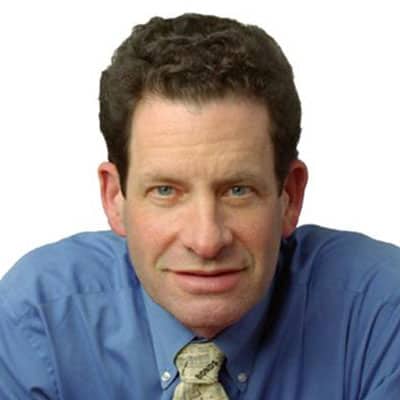Today, I’m joined by first time guest Ken Fisher. Ken is founder, executive chairman, and co-chief investment officer at Fisher Investments [15:43]. He’s also a prize-winning researcher and bestselling author.
Ken breaks down his process for finding the best investing ideas… and why he believes this bull market will continue higher.
In my educational segment, I share a fantastic example of why boots-on-the-ground research is critical [51:17]. One company is down over 40% in the last few months… But thanks to my field work, I already warned you about it. Now management is making awful excuses regarding its recent earnings miss…
And be sure to listen to my rant—which was triggered by dinner plates, of all things.
Wall Street Unplugged | 679
One on one with investing legend Ken Fisher
Announcer: Wall Street Unplugged looks beyond the regular headlines heard on mainstream financial media to bring you unscripted interviews and breaking commentary direct from Wall Street right to you on main street.
Frank Curzio: Let’s go on out there, it’s July 24th, and I’m Frank Curzio, host of the Wall Street Unplugged podcast, where I break down the headlines and tell you what’s really moving these markets. Did you see the latest news on Macy’s? They started selling these dishes as a set. And dishes come with three circles on them and the smallest circle is called skinny jeans. The middle circle is called favorite jeans and the largest circle, and these circles are on the same plate is called mom jeans. Apparently this offended tons of people, so they say tons, of people. Then one person tweeted, “How can I get these plates banned in all 50 states?”
Frank Curzio: Of course, tweet went viral. Everybody was up in arms. When I say everybody, people on social media and Macy’s did what most corporations do, right? Came out, apologized, the politically correct thing. So we’re moving the product from all stores, that we missed a mark on this product. This comes at the heels of what we saw at Nike when they pulled all of its sneakers that had the Betsy Ross flag on it, right? So they pulled it 4th July Independence Day. They’re beautiful sneakers. The Betsy Ross flag on the back of it and we had one person that was the biggest attention seeker since Kim Kardashian, who said the flag’s design, which was created back in the 1770s represent the original 13 colonies, that flag is associated with white supremacy and slavery.
Frank Curzio: Although 99.9% of the population does not see the Betsy Ross flag as racial or as a symbol of slavery, and that includes pretty close to 100% of the stories, including the Anti-Defamation League who keeps a database of more than 150 hate symbols. And Betsy Ross flag was not on it, of course so it even surprised them. But what happened? Nike came out and said, “Hey, sorry, we got this wrong, we apologize.” And they pulled those sneakers from the market immediately.
Frank Curzio: Last month, St. Louis Park, a small city in Minnesota, said that in order to create a more welcoming environment to a diverse community, we’re going to forgo saying the pledge of allegiance before every meeting. They came up with a vote and they decided to ban the pledge of allegiance because it’s not welcoming to our diverse community. They had five people who were voting on it, five whoever people that they chose, and of course every single one of them supported the ban. A lot of social media got involved. People came out and said, “Okay, this is BS. What are you doing? Whatever. And they quickly changed their mind and said, “Well, we had to because we’re getting threats and people are, we are scared for our lives or whatever.”
Frank Curzio: But this is just three of hundreds of events we’ve seen over the past couple of years. That’s pretty crazy, right? When you sit back and think about, and as a country, and I’m being serious here, I mean, we really need to get our shit together. We need to grow some balls. If we’re going to let less than 1%, much, much less than 1% of population who are miserable, I won’t curse. They hate life, hate themselves. Wake up angry every day, complain about every little thing. I mean, that’s what social media is right now, right? If you look at the angry posts on there, I’d say 70% are probably angry. If you look at Trump, who has the most followers, I believe, with most followers, I would say about 80% of them are negative, are people just bashing him. But it’s all anger, and people are pissed off. If we’re going to let these people dictate the direction of this country, I tell you, we’re in a lot of trouble.
Frank Curzio: And the apologies from Nike, from Macy’s who did nothing wrong. It’s ridiculous. Now, wouldn’t it be nice to see a CEO come out and tell it like it is? Don’t be politically correct. I would love Nike to come out and say, “Hey, Colin Kaepernick, this is more about you than about our country. The flag does not offend 99.999% of people buying our products. So F off. And if you don’t like it, then you know what? We’ll end your contract. We’ll file your and stop paying you.”
Frank Curzio: Right, look at this, I mean, yeah, Nike is paying Kaepernick. The NFL was paying Kaepernick. They had the right to reign this guy in. He’s on their platforms and he has freedom of speech. But if someone says that they hope that Hillary Clinton dies, you could say that, it’s freedom of speech. But if someone works for me and says that I’m going to fire them immediate because they’re saying that on my platform, and they’re saying that at my company. So when you’re working for these companies, you don’t have freedom of speech to say whatever the hell you want. Do that on social media. But the fact that they give in all the time to these people is sickening.
Frank Curzio: Let me tell you something. Because of Macy’s, Nike, if they both said, “Look, we’re not removing our products. If you don’t like it, then don’t buy it.” You know what, they’ll probably see a shit storm of negative press because people love that, love talking negative. They may lose a little bit of business, some business, but you know what? Saying something like that creates loyalty. It’ll create loyalty to your brand, which is much more powerful than having customers who barely shop at your stores dictate what you should sell because they’re offended. Such a big word these days, we’re offended.
Frank Curzio: Well, I make fun of Peter Schiff a lot because I don’t think someone who has been dead wrong for 10 years and lost tons of money for its customers should be criticizing anything. But he is a gold bug and he has a massive cult-like following. He doesn’t care about guys like me who I’ve called him out on Twitter many times. He won’t apologize for anything. He doesn’t care. And that’s why he has such a loyal following. It doesn’t matter, they just believe in him. And that’s fine. That’s cool. I can’t believe we’re even talking positive about Schiff here, but you get my point. He doesn’t back track and says, “Oh, I’m sorry. Bitcoin, you guys are doing okay. I didn’t mean that Bitcoin is going to sink.” No, he doubles down, doubles down. This is what he says. But that’s how he feels. And I give him credit for that.
Frank Curzio: There’s so many people that back up, they always apologize for things that they shouldn’t really apologize. Is it offensive? No. The Macy’s plates. Come on guys. Give me a break. You have to stick up for yourself. I mean, Nike should tell Kaepernick to go F himself. If he has a problem with that, again, just fire him. That’s what builds loyalty. People love that stuff. You’re not apologizing for everything. Like the Macy’s coming out and saying, “Oh, we’re sorry we offended with you with a dinner plate that says, “Mom jeans.”” I mean, what’s next? Are you going to ban all manufacturers of double tee tees? And do you ban the pledge allegiance in all schools. You’re going to ban everyone from drinking Coca Cola at McDonald’s because it’s bad for you even though it tastes great?
Frank Curzio: You sound like the person who is eating these things that you so called try to help because you’re offended or whatever, it’s not like they’re not going to go to Taco Bell Pizza Hut instead of the McDonald’s rule and Coca Cola, they just make something that everybody loves. Is it good for you? No. But people love and they keep buying it. Look at Coca Cola’s earnings, all time high. Look at McDonald’s, also on all-time high. People love this stuff. But yet, if it offends a few people and with social media you get things to go viral and everyone is out there backtracking, apologizing.
Frank Curzio: It’s terrible. Man, I’d like to hear your thoughts on this Frank@curzioresearch.com. Man, I’m sick of it. I hate it. I hate seeing stuff like this. Just speak your mind, if you’re an ass, you’re an ass, be an ass, that’s you. But don’t create something like Nike, which is a beautiful sneaker for Independence Day, celebrating our country and because one idiot is like, “Oh, well, back in the 70s that …” I mean, come on, give me a break. You’re going to change, you’re going to remove your sneaker, do all of that? I mean, what kind of loyalty does even that build? Because I can tell you there’s a lot of people that are not buying Nike products because of that. But your most loyal followers, they will love that. They’ll watch and say, they want to believe in your brand, but when stuff like that happens where most people disagree with it, man, it’s frustrating as hell. And it keeps happening and happening and it’s getting worse.
Frank Curzio: When people would get the word offended, people are offended by everything these days. Their feelings. Oh, you hurt my feelings. Big deal. Come on, give me a break. It’s insane. Anyway, you say something own it. The apologies and all this craziness and backtracking and stuff, it’s just for me, it looks terrible. It makes me not want to support your brands, not support those people who are doing it.
Frank Curzio: But we really need to grow a pair of balls and I hate to put it that way, but we do. And what’s going on with this country? My kids, when I go to school and oh, we make sure everybody gets a trophy. Oh, I’m like, “She was in a baking contest.” And before they came out and it was like six groups, which by the way I love it because there was the two boys actually. Yeah. Look, it’s a camp and I’m a parent so I get it, right? You want some time and it’s summertime, you have your kids all day. So you hear the mother is like, I don’t care. Two of the mothers put their boys in cooking camp who are like 12 years old and my daughter was in her twos and they were a team and they can wear basketball shorts, basketball shirt and it’s above the rim and stuff like that and they made a cupcake. The boys made a cupcake that had lifesavers in it, Pop Rocks and M&M’s. I loved it. That’s exactly what I would have did. But that’s what you get from boys.
Frank Curzio: Anyway, before they came out, there was four judges who were younger and they were like, “Okay, please don’t try to offend them.” But like, we were so worried about hurting people’s feelings or offending them, but me growing up, that’s what motivated me when people said, “Hey, you’re too fat to play basketball. You can’t do this. You can’t do that. There’s no way.” I love that word can’t because every time someone told me I couldn’t do it, it made me want to do it.
Frank Curzio: But today you don’t say that to people. You have to be nice. You don’t want to offend them, and we all know that’s not the real world. It’s not, you’re going to get eaten up like crazy when you get out there. It’d be terrible. I see that firsthand. I live in Florida. It’s not, there’s no accountability. Kids don’t show up to do a job. They show up three, four days later. I mean, it’s insane. The work ethic here is insane in this state. It is terrible. It’s horrible. I thought I’d get used to it. I’ve been here for 10 years. I can’t get used to it. People hate to work here, they hate it. It’s not all they’re on island time. Who wants relaxed? No, they hate to work, they don’t want to work. They’ll do everything they can not to work. I’ve never seen anything like it, growing up in New York, we had to fight for your jobs.
Frank Curzio: Anyway, this word offended and worrying about what people think all the time, guys come on. Give me a break. Nobody is perfect. We’re going to make mistake but you’ve got to, you’re just going out there, and removing product lines and because it offends a few people and something goes a little viral on social media. Come on. Love its trolls, love its garbage. Guys, we got to grow a pair of balls because man, this country, to me it’s not going in the right direction. I may be all alone on this. You may think I’m crazy. I have no idea what I’m talking about. Let me know Frank@curzioresearch.com. Sorry, I just had a rant about that because I don’t think it’s funny. Macy’s are moving plates for a few people that are offended and we’ve seen this happen with Nike. We’ll probably going to see it happen with more companies going forward, how just a very, very tiny portion of the population controls and dictates what so many of these countries do, what our politicians do and you know what? It’s pretty insane right now.
Frank Curzio: Anyway. Let me move on before I keep going and going and going because I have an unbelievable interview for you today. My guest is a billionaire, legendary fund manager. I mean, I’ve got a few hands here, I’ll give you one more. He’s on TV a lot doing commercials where he rips apart and says, “I hate annuities.” Did you guess it yet? You should have. If you watch CNBC you’d guess, because he’s on there all the time doing commercials and also on there being interviewed. His name is Ken Fisher.
Frank Curzio: Ken Fisher managed over $100 billion as funds. He’s been managing money since 1979 when he created Fisher Investments, a regular columnist in USA Today, Financial Times. He was a columnist for Forbes from 1984 to 2017 but it’s the longest running columnist they ever had in the history of their company. He also writes to several international publications, authored 11 books, wrote ton of papers on behavioral finance and man, I’d keep going and going and going, and he’s also accredited, which I thought was pretty interesting for being the first to use the price to sales ratio as a forecasting tool.
Frank Curzio: Enough about the accolades. It’s going to be an awesome interview. We’re going to dig in to lots of great stuff including why he is super bullish on stocks on US stocks. Talk about a little bit why he hates annuities, which is pretty easy to find. You guys already know that, I don’t want to get too much into that because I like interviewing people and getting things out of them that you can’t get any place else or read any place else, which includes me breaking down his research process and talk to him about how he finds his stock picks that make it into the portfolio, how all capital markets are integrated, we’re going to talk about that. He’s going to say how stocks make their way into the portfolio and how important is to adapt to the markets and that’s what he’s been doing. For example, the past couple of years his largest holdings are mostly technology stocks and are top 10. And they’re doing great because he adapted.
Frank Curzio: So a really, really great interview coming up. You’re going to learn a lot. In my educational segment, I’m going to break down the latest results from iRobot, which were terrible and why I think the company is still in big, big trouble even though it’s down around 20% today on earnings and down to $70 a share from 130 a couple of months ago. I’m going to break it down and tell you why I still don’t like that company, why you shouldn’t embalm fish and why it’s probably going to go a lot lower. Before I get to that, let’s bring in the billionaire, the author, the money manager and the legend, Ken Fisher. Ken Fisher, thanks so much for coming on Wall Street Unplugged.
Ken Fisher: I’m delighted to be able to do it. Thanks for having me, Frank.
Frank Curzio: Oh, well I’m a huge fan. I’m not sure if you know this or remember, but I interviewed you on my podcast, which was called The Real Story back then, and this is when I worked @thestreet.com I believe it was late 2009 if I’m not mistaken. And during that interview you happened to be extremely bullish back then at a time where most investors were definitely scared to invest in the markets. Just coming off the credit crisis, I was surprised by your call, you turned out to be dead on, it’s a great contrarian call. Now how do you feel about the US markets today?
Ken Fisher: Well, you can go on with that for three and a half hours, but to make a long story short, the bull market and the bull market has more to run and, it probably runs longer than most people think it does but then it’ll end 10 foot. It’s a nice little world. It’s almost … In the mid-nineties, this kind of the world would have been referred to as the Goldilocks economy and it would have been met with more optimism than we have today. John Templeton, he had the famous line that bull markets are born on pessimism, grow on skepticism, mature on optimism and die on euphoria. And we’re very clearly neither pessimistic nor euphoric as there is a skeptical optimism in people’s mind. And that tells you that unless some big bad, terrible thing comes along that nobody sees it coming at them, therefore it’s not pre priced, which happen sometimes, but it’s very rare. We’d probably keep trudging along until we get to a more euphoric world. It takes quite a bit of time to get to from here because you just turn around three times on Sunday and you can see that people aren’t very overly optimistic in a broad sense.
Frank Curzio: So again, based on what you just said, you have to talk about how news, events, or early price into the market, especially investors and the media talking about it. So you’re saying it’s a bullish market and when I look at that thesis where you talk about where it seems like, “Hey, we’re talking about trade that’s factored in geopolitics, or Iraq should be factored in even politics themselves, should be factored in.” So what is, is there anything out there that you think could derail this or something that worries you where this bull market trend will change?
Ken Fisher: No. Matter of fact-
Frank Curzio: Good answer.
Ken Fisher: … I look at all kinds of things and there is nothing that I see in the short to intermediate term, which is all that markets price, markets don’t price it very long term, that I can see that derails this world. If you don’t climb the wall of worry to euphoria, you got to have something big and bad enough to turn normal growth, which in our world is globally about a little less than 3% maybe with a hare’s whisker of inflation, but in an $80 trillion economy that’s something in the realm of over 2.5 trillion USD. From that growth that needs to turn it into recession. I can’t see anything that big that isn’t widely bantered, pre priced, digested to high holy heck.
Ken Fisher: We still have a world that’s looking for ghosts around every corner because the last downturn was big and bad. It scared people. That fear has caused people to be grudging the whole bull market up. Therefore, we’ve had a relatively joyless bull market, so therefore it’s been long. The longer it’s ground on, the more people think it’s going to die of old age. Markets don’t die of old age. They never have, they never will, that’s not what causes markets to end. And so you sit there and grind, well, people keep grousing about all the things that could go wrong.
Frank Curzio: Now when I look at … So say now you have the bullish thesis, right? You say, “Okay, I don’t see anything derailing this for the next 12 to 18 months.” Let’s dig down to how do you play it? Because I look at some of the holdings in your portfolio and it’s very technology growth weighted where when I look at a guy like David Einhorn, who I do like, and I don’t like to talk negative about anybody, but he has a value style that hasn’t been working for five years and refuse to adapt. Talk about the methodology where, okay, here it’s bullish. Now I’m going to invest in this, it is evaluation? Is it growth? Do you look at a macro, top down, bottom down? Can you take me through that process because it seems like your, it doesn’t seem that way, but your portfolio right now is perfectly positioned for a bull market where you’re heavily in love with technology and these have been the best performing stocks at least over the past 12 months.
Ken Fisher: Basically, I think in the following way, and I’ve thought this way for a long time. You start from a global top down macro basis. You presume that the world is in an economic sense, globally integrated and that capital markets are heavily globally integrated. So that for example, while America may do better or worse in a period of time in the stock market than the non US market, the big blocks are going to basically move the same direction. Then you start saying to yourself in sectors, that’s true too. And then growth in value, big and small, that’ll be true too. And then you start saying based on where we are and what’s going on, what are the categories of those that should be doing better versus worse? And then you plan, build your portfolio in those ways. And then you start looking into the stocks that meet those categories.
Ken Fisher: So I would say just basically that the nature of stocks that do best in the latter stages of bull markets are always categorically different than those that do best early in a bull market. And sometimes there’s variation in a country, but for example, value routinely does best bouncing off the bottom of a bear market, and the latter stages of bull markets are usually dominated by companies that could be categorized and this sound sarcastic, but it’s true, categorized as the kinds of stocks that the last greater fool into the market would find himself or herself comfortable buying when just a few moments before they were too scared to own anything. So those uniformly regardless of cycle end up being big, broad household names where they’ve got some growthy qualities so that person can look off into the future 10 years from now and say, “I think they’ll still be there, and they’ll still be going strong.”
Ken Fisher: And those that’s that do best and sometimes that’s been healthcare, sometimes that’s been consumer discretionary, sometimes that’s been tech. But then you start parsing down as to what would make that go further and yes, in this cycle that’s the dominant feature. In fact, this is a parse that most people don’t do but if you parse out, tech categorically from the other sectors, Americans and foreigners as well naively believe that the American stock market is doing better than the non-American stock market. That’s really only true because of tech. If you take out the tech in both sectors, for example, American and Europe will be doing the same when most Americans will look down their nose at Europe and not get that the non tech part of Europe is doing as well as the non tech part of America.
Frank Curzio: That definitely makes sense. Especially how big the tech companies and the market caps and how the largest companies in the world right now are in the US. Now a lot of the things-
Ken Fisher: Not just right now. I mean, America dominates tech. The overwhelming degree to which America dominates tech is not fully fathomed in my opinion by most people in America, they just take it for granted.
Frank Curzio: … Now one of the things you just cited in terms of they could be healthcare, it could be consumer discretionary depending on the time or the markets and tech which lead the markets in bullish cycles. I’m sure a lot of this has come from you’ve been in the industry for over four decades, and I know that when I started looking at Jenna Folly, I know that you really focus on historical patterns, also behavioral and stuff like this. Has your thesis changed on that? Looking at historical patterns where of course you can look at historical patterns, and I know that you mentioned, at third cycle of presidency, the market usually does well, so it’s no surprise that it’s going up right now. But has things changed to the point where you’ve heard this, and I’m sure you’ve heard this, I’ve heard it where margins are supposed to revert back to the mean?
Frank Curzio: I’ve heard that argument for six years, but yet productivity is through the roof where we have the internet now, back in the day, my dad used to be in the sitting room, my late dad where you had to go to the library to get 10 k’s and now you could send something in a minute and talk to the world. But does that change your historical perspective, especially bringing in more macro factors like low interest rates for the first time at these levels where you look at different data points that come up to this research? Has anything changed or no, you’re still using the same methodologies when it comes to tracking historical patterns?
Ken Fisher: Things never change and things always change. And intuitively that’s been the way it’s been since, well, at a minimum in the industrial revolution. In this period and relative to the things we’ve been discussing, in my opinion, one thing that’s changed which you’re alluding to very directly is the ease at which someone can recognize historical patterns. I think when you think of history and what has gone on before us as a potential guide for future actions you need today, which you didn’t use to need to do a long time ago back in the day that you refer to that I remember intimately as a professional when you had to go to the library to get it. You think of it in two different ways. One of it is, and Jeff Silk, who’s been with me for over 30 years coined this phrase, ABC, which is anybody can do it. Anybody can. And so you say to yourself, “What can you find out about all that stuff that it doesn’t apply to, where ABC doesn’t impact?”
Ken Fisher: And the other is, what is it that ABC does impact that quite simply no one will believe? That is just beyond the ability of the human to say, “Yeah, I accept that.” You’re looking for those two kinds of things categorically. The reality is that there’s a lot of stuff that goes on in the world that history implies, but you can’t capture in data. And then therefore it’s no easier to get now than it ever was. On the other hand and in reverse, there’s things you can just flat out say or if I shove it right in your face, you just won’t believe it. Those are the ways you think differently about that. I’m still a big believer in the notion that history can teach us huge amounts, but I also have the view that if it’s easy to find the pattern and the pattern is believable, it’s already priced. I mean, to your point of the way you raised the question, that part of what I think is categorically true.
Frank Curzio: Now through this whole conversation it seems like, and I don’t know if you would contribute this to you success and people define success a lot of different ways, considering you’re a legendary fund manager and you’ve been doing this for such a long time, great returns and then growing your business. But what are some of the things that you’ve learned? Because what I’m learning from this conversation is you always seem to be willing to adapt to new and changing times throughout your career. And I see that with a lot of fund managers where even as men get older, they get stubborn in their ways and they don’t change, but it seems like you’re abreast of the market. You understand it’s a growth market. It seems like you’re ahead of the curve. What did you learn over the past few years because it seems a lot of people that I interview fail to adapt to what the market is giving them. And it seems like you’re adapting, you understand it’s a bull market and you’re positioned accordingly.
Frank Curzio: I guess all I’m asking is, did that change over time? Did you check your ego at the door and say, “Hey, we need to adapt.” Or is it just this has been your investment style the whole entire time since you started your firm? I believe it was in the late 70s.
Ken Fisher: I don’t really know the answer to that.
Ken Fisher: I have things that I believe, but I’m not sure they’re right. Let me tell you what I believe. I believe I was lucky to be born a youngest kid, and to be stupider than my older siblings and the younger and stupider part also implied that for a long time I was smaller and physically weaker and all that stuff. What that always made me do is seek out what can I get in the face of stronger competition? And it is always true that when you’re in the market, you’re up against stronger competition. And I’ve known that from the beginning of my professional realm and that I have to be thinking about what is it they don’t want that’s good that they can’t find? And when I mean that, I don’t mean that just simply as a business competition against my firm, for which that statement still applies.
Ken Fisher: But also when you think about, what for example Ben Graham would have referred to as Mr. Market. It’s just what I’ve referred to in more recent decades as the great humiliator whose goal is to humiliate you and everyone else for as much money as possible for a longer time as possible and in the most embarrassing way as possible. And your job is to engage the great humiliator without ending up humiliated by it. The reality of that is you have to keep thinking about the fact that you’re up against this competition. Now the other part that I’ve embraced before I started my firm is I was hugely impacted as a very young man by the power of the integrated circuit and metal oxide in semiconductor technology. And in that realm I saw this world changing, which we today refer to as the effect which is now fairly old and mature of Moore’s law.
Ken Fisher: And yet technology keeps changing things and yet human psychology never changes. So you keep blending that part where the one part it is changing, the other part is not changing, the one part it is changing, the other part is not changing. That keeps going. And so you keep looking for the change. In that regard, Frank, I’m actually stubborn. I mean, I’m stubborn and unchanging because I keep doing that same thing I’ve been doing now for all these decades, which is don’t change and change. Don’t change and change. That part about human psychology, it does not change. It’s never changed in my lifetime. I don’t think it will change.
Ken Fisher: On the other hand, that other part about keeping and looking for the new thing now, my fascination with technology there is not about my overweight to technology in recent years because the time you don’t want to be in tech is early in a bull market, but that’s a different point. The part about learning about markets, seeing how things that are changing in technology and in culture changed the way we should be thinking about the tactics is just purely tactical. If you stick stubbornly to old tactics in today’s world, you’ll get buried and that should be obvious to anyone.
Frank Curzio: Yeah, now that’s well said. Once again, I’m talking to legendary fund manager, Ken Fisher, and if that name rings a bell for you, it’s the guy that you see on TV a lot, which is going to go into my next question because I noticed you’ve been doing your own commercials for a while but the last few years, and you correct me if I’m wrong in this, but they seem to be a little bit more edgy where not that it’s coming from anger, but it seems like it’s something that you don’t like what’s going on in the markets. And I know you expressed this and I saw an interview where a lot of these competitors do not put their client’s interests ahead of theirs.
Frank Curzio: I noticed you have commercials like, “Hey, if you hate annuities, this is what you should do.” Have you seen a change at least over the last 10 years? Because for us, and I’m a newsletter guy, I’ve been in newsletter industry for over 25 years and my late dad was a newsletter writer before me for 30 years. There’s a big change in our business where people, do I have numbers behind their forecasts. It’s crazy and it’s less focused on the consumer today than it’s ever been in my opinion, especially in the financial industry. Are you seeing that as well, is that leading to it? Because I noticed the commercials are a little edgy, but you trying to say, “Hey guys, this is the way you’re supposed to do it.”
Ken Fisher: I wouldn’t go there. What I’d say is this, our advertisements from, first there’s more advertisements, we do more advertising than we used to, and that’s also because we’re bigger but they’re also more bifurcated than they used to be. And I think the difference that you’re not fully recognizing is the degree to which we’ve bifurcated. And let me describe that for a moment, if I may. The reality quite simply is that when we started doing what in the regulations under the Investment Advisers Act of 1940, are advertisements, they were direct mail, which is direct marketing. Then we evolved over the next couple of decades back. Then we evolve beyond mail into other forms of direct marketing, and then we started eventually to do direct TV, which is the first ads that you would have seen. Then we evolved to create a couple of years ago as opposed to direct marketing on TV, branded advertising on TV to stimulate the direct marketing.
Ken Fisher: And the branded advertisements that you see are exactly not what you’re talking about. The branded advertisements are for example that comparison ad where you’ve got four people and they talk about some do this, some do that and they’re not so edgy. They’re more friendly. Then the ones that you see with my face now are the edgy ones and they’re too balanced to joke around. So the annuity ones, yeah, they’re edgy. You got that right. The ones that talk about the fiduciary standard, they’re edgy. You got that right. But the totality of them is not more edgy because they’re all set by the branded advertising ones, which are to use a phrase in opposition to the edgy are, because non edgy is not a great phrase. They’re just softer.
Ken Fisher: It’s more of a total balanced picture, and if you take apart the pieces as we bifurcated, there’s parts of it that are more edgy. Now, do I believe the part about annuities being a social problem? Yes. We could talk about that if you want to. Do I believe that there’s issues about the fiduciary standard? Yes, we could about that if you want to. But all of these are subsets. Now, the fiduciary standard, is just one little point. There’s been a big deal about that made in the media now for a couple of years with the back and forth of the DOL standard that was refuted by the courts as you know. Then just most recently, the SEC’s Best Interest Standard that’s just very recently introduced and all of that has provided a lot of attention, which makes that a good backdrop to add in those ads.
Ken Fisher: So we’re just in a sense using contemporary phenomena that are going on as a backdrop to put in that specific ad, but I’m not sure that if you only do the ads that they work, the beauty of direct marketing is that if they don’t work you know it. If they work, you keep doing them and they won’t work forever because they’ll all fatigue and they have to come up with a different ad behind that. I’m not that much of a marketing expert, but we’ve got people who are pretty good at it. And one of the things I know about all these ads is you do it and after a while people don’t want to see it anymore and it fatigues and you got to have a better ad after that to replace it.
Frank Curzio: Yeah. And you talked about the edgy part and the ones that aren’t so edgy and one of the things that aren’t so edgy is one commercial I just saw I believe yesterday where you have an investment guy to a comfortable retirement. And I noticed that you’ve been doing a lot of commercials this way where you’re targeting individual investors and ensure most of them are accredited. But normally you don’t see too many large money management firms where they just focus on institutional money. The fact that you are targeting that audience, I guess maybe you could answer this question, those individual investors that do come over and say, “Okay, I want you to manage my portfolio.” What are some of the biggest mistakes that you see?
Frank Curzio: I mean, you look at portfolio and say, “Okay, this is pretty good. We just got to restructure a little bit.” Or are you seeing these portfolios as the same and wow, these things have to … For the goals that you’re looking at, and everybody has different goals. I don’t want to get into too much of it, but just say the average retirees give you their portfolio to manage. Are you seeing a lot of things wrong with that portfolio? Like some of the biggest mistakes that they make, that you could address to that when you have that portfolio under the Fisher brand?
Ken Fisher: Most investors actually don’t buy, most investors are sold. In the world there’s a large universe of product sales people selling all kinds of different products. And what you mostly see is people loaded up with products that really they don’t need, that aren’t really right for them, and maybe products that are okay if they were very small proportions of them. But often that’s chasing heat because the stuff that’s been hottest in the marketplace most recently is the stuff that’s easiest for the product sales person to sell.
Ken Fisher: You typically see that as the biggest single mistake or exactly the reverse of that, and the reverse of that is someone who for eons sits on cash and just can’t get themselves to take risks. With that client, you need to go through ultra-heavy, triple dose of education and by triple dose, what I mean is, when you were in school, when everybody else was in school the average student was average by definition. And in theory, although I’m not sure that applies in today’s educational world uniformly, that person got a C grade in school and the really exceptional person got an A and then you had that almost bell curve like distribution that was supposed to be from A to F and all that.
Ken Fisher: Ff you think of that average C student, the average C student didn’t really learn that much of it on the first time that teacher tried to teach him. And if you really want that student to get it, you got to do it once, do it twice, do it three times, which is basically what a bachelor’s degree in college does in almost any major. They take you through it about three times, so you’ll understand it more or less by the time you graduate. Because the average student, when they take it as a freshman or sophomore in the basic class, doesn’t really get it because they only get 70% of it. Then they take it again as a junior in a different format and they get a little more and they take it again as a senior in a different format and they get a little more. You have to do that triple dose of education with these people to get them to really understand how the parts of the motor fit together and how the motor runs. That’s pretty much it.
Frank Curzio: Yeah. It’s amazing because everything that keeps coming back to it is like behavioral, right. Like relearn just even something simple that you just said where it’s 70% is the first time, then a little bit more they’ll learn more on that after the third time, and you talk about behavioral finance so much, which I think gives you an edge even looking at just allocation for a portfolio or how do you see the worlds and stuff like that [inaudible 00:40:30]-
Ken Fisher: The biggest enemy of most investors system is themselves and the second biggest enemy is a product sales person that wants to prey on them.
Frank Curzio: That’s definitely a good point. I want to move on really quick, I know we’re running a little bit late here and I know your time is very valuable. Your array of columnist in USA Today, Financial Times, Forbes, which a lot of people know from ’84, 2017, the longest running I believe in history of that, of Forbes. You also contribute to seven international publications, authored 11 books including I believe the name is Super Stocks, where you’re accredited for being the first to use the price to sales as a forecasting tool, which I learned by doing some research. I didn’t know, that’s amazing. You have also written tons of papers on behavioral finance. It’s a huge workload on top of running a very successful investment company. What keeps you so motivated?
Ken Fisher: Oh, I drink a lot of coffee. I’ve have been drinking a lot of coffee for a long time. I like it black, that way nothing gets in the way of the caffeine.
Frank Curzio: That’s perfect.
Ken Fisher: Yeah, I like what I do and I’ve always liked what I do. And if I didn’t like what I do, I wouldn’t do it because I had been free to do what I wanted. I mean, that’s the beauty of being a founder, formerly founder, CEO and now a founder. It’s like you’re chairman, but founder running the place gets to do with he or she wants to do. They got to do a lot of other stuff until they can get rid of that stuff, handing off to somebody else. But you do what you want to do. That’s the fun part. If you’re doing what’s fun, why would you want to quit doing it? So you just keep doing what’s fun and then you get up in the morning and you’re excited to do it. That’s what keeps me motivated. That, and every morning I drink coffee.
Frank Curzio: No, it’s great to hear as someone who’s been in this industry for such a long time and he’s still so passionate about it. I could tell by just all the things that you do for someone who I’m sure who could have retired a long time ago and going out there and really helping and teaching a lot of people out there. Real quick, a lot of people see you on TV. They know you’re a money manager, they know you’re a legendary fund manager. You’ve been around for a while. I don’t think people realize that the philanthropy part with you and your wife and donations and stuff like that. Can you talk a little bit about that? Because when I learned about you and how much, just the giving part and so many different places that you guys care about, it’s pretty impressive and nobody really talks about that. And I just wanted everybody to understand that you guys do a great job. Could you just give us a little insight into that because it’s pretty amazing, why [inaudible 00:42:56].
Ken Fisher: Oh, no. I actually disagree with all that. I’m not a giving person at all. I’m a mean, nasty, ugly son of a gun. My wife, she gives away money sometimes, but me I’m opposed to anything other than creating jobs and working hard and grinding people’s noses off at a grindstone and stuff like that. I’m a big fan of grinding people’s noses off the grindstone.
Frank Curzio: Definitely a big fan. Yeah. But you have donated to several things and a lot of them have your name on it, but I think you’re being a little bit modest there. And I understand, yeah, you don’t want to give the certain things, but just the research the I’ve seen-
Ken Fisher: Because generally categorically, and this is one that gets me into trouble whenever I say this in public because it’s aesthetical to our culture. I’m not a fan of philanthropy and basically I view philanthropy as mostly a bad, not a good. It’s not as bad as many other bads, but for the most part, and I learned this when I was very young, the capital markets pricing mechanism generates efficiencies for the benefit of humanity as capitalism evolves providing income and wealth to people in a broad spectrum, despite all of that talk about income inequality, et cetera, in ways that are better in the intermediate to long term for people than philanthropy.
Ken Fisher: When my wife and I have given away money, I always feel a little guilty about it and I got to believe when we give it away that we know enough about the topic matter that I don’t think we’re giving away so that it will be bad enough related to what would happen if I more or less left the money in the capitalistic system for the capital market’s pricing mechanism to generate efficiency through some process, like having it end up in a venture capital firm with starting a lot of companies or ending up in a place where somebody that’s got a little business in some place, gets a loan and then hires more people and creates the greatest thing since sliced bread. That’s the next Amazon or whatever.
Ken Fisher: Not that I can control those things specifically because I cannot, but the capital markets pricing mechanism does it for me more efficiently than any benefits that come out of philanthropy, as you look at philanthropy overall. As John Rockefeller said, philanthropy is really a difficult thing to do. Well, and most people take it way too lightly as a good, it’s actually, if you just give it away, it’s mostly a bad.
Frank Curzio: Yeah, you definitely want to know where the money is going at least, that makes sense. Ken, I want to thank you so much. I’ve really dug down into picking your mind about your investment style, how you’ve been so successful. Hopefully that was okay. It’s a little different from what I’ve seen with your other interviews, but I know that’s what my audience really likes to see. They just do, they’re investors. A lot of them are credit investors. They want to learn more, so I appreciate you coming on. If anybody wants a [inaudible 00:45:54]-
Ken Fisher: You do a great job, Frank. Thanks for having me. I’m pleased.
Frank Curzio: … Oh, I appreciate.
Ken Fisher: I’m happy. It’s easy to talk to talk with you.
Frank Curzio: Oh, thanks so much. If someone wants to find out more information on you, how could they do that?
Ken Fisher: Well, I think if you do a Google search on Ken Fisher, it’s not that tough to do.
Frank Curzio: And if they want to get some more information may be about your investment fund to invest in it, how could they do that?
Ken Fisher: I think they could probably do a Google search on Ken Fisher and figure out the firm that Ken Fisher works at and then go to its website. It’s not that hard to do.
Frank Curzio: Ken you are an expert in the field of finance and you should know that-
Ken Fisher: We’ve always tried to make it easier for people to figure out where we are.
Frank Curzio: … Every extra step people have to do seems like they drop off, so I hear you. But it will be a very easy to find it if they do a Google search. Ken thanks so much for coming on. I really appreciate it and hopefully you’ll join us again soon.
Ken Fisher: Thanks for having me, Frank. It was great.
Frank Curzio: Man. I love that interview. I mean Ken speaks his mind, right? This is his personality, but I wanted to give you a picture of how a billionaire thinks, because most billionaires I interviewed, yeah, sometimes they may not be the best conversationalist. Most of them, probably all of them are super confident, so they may come off as arrogant. Not that Ken came off as that. But I love the fact that he speaks his mind and he does and you will see some of the quotes, I even pulled before the interview. I mean, he goes out there, he calls people idiots who’ve been talking about inflation, more money is coming into the system. Where is it? Show me, he just really goes out there now. And that’s what I was talking to him about, advertising, it’s a little bit more edgy.
Frank Curzio: I love that he talked about the fiduciary responsibilities, right? Because we do see that where it’s more about in my world, and in Wall Street, it’s more about profits and what they could do for themselves more than putting their customers first and their best interest ahead of theirs. Which I know, especially when I see crypto and things like that, I mean, it’s not the case. People are just looking for money grabs in a lot of different industries. It’s not that difficult to get them legally. I mean, look at the short sellers. Hey, Spruce Capital came out and said, “Oh, tomorrow we’re going to ensure.” This is Tuesday, “We’re going to sure. We’re going to come out with our best sure recommendation ever.” They said that. They said it was one of the most investigative research that they ever did and they said, “We’re got to come out with it tomorrow.”
Frank Curzio: And they put that out on so many different sites. And what that means is we want to increase our sure position before we put this out and which is legal guys. And we’re going to, we have to contact the 25 lawyers that are going to launch investigations on this company, one second after we published the report, which I don’t know how they do that since they didn’t get a chance to read it, but they’re all going to come out with investigations on it.
Frank Curzio: Then they can say, “Okay, let’s go to all of our media channels.” This is where they’re going to publish it at the same time. And they just get everything ready, and the stock is going to fall or whatever. They get five, seven, 10% sometimes 20, 30% depending on how crazy the report is. They’re going to say that the company is going to zero, which is not true. It’s probably about 20, 30% overvalued. But they get away with it and then they cover their position, if I would guess in a couple days, maybe a week or something, while everyone is still sure, thinking, “Oh, my God, this is going to zero.” And then they’ll go on CNBC, “No-no, we’re at that position.” It’s legal. They do it. They take advantage. That’s the market. That’s one of the gains to have a Ken, it’s crazy out there. Quick money grabs.
Frank Curzio: But what I wanted to capture in that interview is how, not just Ken, but billionaires, they have one thing in common. They look at the world differently than everyone else. At least the billionaires that I’ve gone to. And probably up to like pretty close to 10 now, maybe eight, nine, 10 around there. I have to go back. Yeah, people that I know who are billionaires, also guys that I interviewed in the past over my career, probably more than 10 I’ve interviewed and spoke to, but they just look at the world differently than everyone else. When I asked him, do you see anything derailing the US economy? He said, “No.” Just no, which I thought was great.
Frank Curzio: And he said, “Hey, you like the answer?” “Yeah, but come on, get into it a little bit more.” But you don’t see anything derailing the US economy, there’s nothing. There is not a terrorist attack. There’s not a crazy geopolitical event that again, it’s things that we can’t see. I mean, Iraq, anything, whatever, which pushes oil prices to $100 again, maybe that? I mean, there’s nothing, it has got to be a few things that worry you, I would think as a fund manager. For me, I’m always, when I’m bullish on something, and he’s bullish on USA, for me I always look and say, “Okay, what’s wrong with my thesis here?” But that was an interesting answer, I thought and it’s a good answer. That’s him. But he’s super focused, very brilliant.
Frank Curzio: Again, I love that we talked about adapting to the markets, but I really like Ken. He’s a guy I grew up watching, so he’s one of the few people on CNBC 80s and 90s where you had like about 15, 20 people on. My dad was on back then. It was Louis and Avalere, Abby Cowen and Mario Gabelli. My dad used to go to the Money Show back then and see a lot of these people, but just to see from 20 years ago, and 25 years ago, knowing this guy very well, and now he’s managing $100 billion, I mean, it’s pretty incredible to see that growth. Definitely doing something right, and I really appreciate that he came to the podcast. But I say this all the time, podcast is about you. It’s not about me. So, let me know what you thought about that interview at Frank@curzioresearch.com. It’s Frank@curzioresearch.com
Frank Curzio: Now let’s get to the educational segment. Yesterday, which was Tuesday iRobot reported earnings, which are pretty good, but they’re a guidance, they’re well short of estimates. I mean, they’re really a load guidance for the full year. So you’re looking at earnings that came out at 25 cents a share, it was 7 cents better than estimates. Revenues rose 15% year over year. They fell below estimates. But the company said that for a full year 2019, they’re expecting on average around 270 in earnings which was much, much lower than the 315 to 340 share they were expecting. I mean holy cow, that’s a really big difference. So their stock is getting hammered, trading down 20%, now trading at 70, which it’s crazy because it started trading over 130 less than three months ago.
Frank Curzio: Now, here’s why I’m bringing this up because this was a company that I told everybody to avoid, and the reason why I told you to avoid it, in all fairness I was saying you avoid it probably for two years, and they’re probably for like actually for about 12 months, nine months or so, especially when I came back from the Consumer Electronics Show. I mean, the stock was running up, running up, running up, but when I went to Consumer Electronics Show, and I looked at iRobot, most of their sales come from those robotic vacuums, like the Roomba. They come out with new versions of them. Their margins are close to 50%, which is unheard of for hardware, for products like and less you are Apple, right? Who maintains their margins, which is incredible and people just love paying $1,200 for phones, and they buy them every single year apparently.
Frank Curzio: But Apple is great at doing that. They’re one of the few companies. You look at semiconductors, it’s a commoditized space, most of it. Because once you create something, it’s easy to create similar products, and you’re going to have, margins are going to get cut, cut, cut. And what is it that be sources, your margins are my opportunity? Well, we have margins of 6%, 7%, I’m sure Amazon is not going to go after any businesses, but when you have margins of close to 50% selling a hardware product, you know what, that opens up the door to competition.
Frank Curzio: Last two years I’ve been in the Consumer Electronics Show, I’ve seen more than 10 companies and probably more than 15 companies selling similar vacuums that were better, that they were displaying right in front of us that were selling at 30, 40% cheaper than Roomba. And remember that’s where they receive the most revenue from. Not to mention not only are these things clean rugs, they had ones that you put on windows, I’m talking about sky scraping windows, same thing, picture that Roomba like thing, it sticks to the window and cleans the windows.
Frank Curzio: It’s like a new generation, of iRobots. iRobots [inaudible 00:54:05] more products, but for me when I saw these new products, it was like GoPro. GoPro is the same thing. GoPro is amazing…It’s a great brand. People love it. But the CES is an international conference for over 4,000 technology companies showcase what they’re going to release for that year and it’s in January.
Frank Curzio: So in Jan those products, you can’t even buy a lot of them, I’d say 80% of me can’t buy it. They’re going to be released sometime in 2019. Well when I went to see GoPro, there was at least 50 companies selling these 360 cameras that did the same exact thing, that were selling 60, 70% below GoPro. And what happened to that company? Same with Fitbit. I mean, there’s probably 500 companies that are selling wearables that check your heartbeat and all this stuff and again. So you see this by getting out there and that’s why I said, “Listen, iRobot guys, these guys are going to be in a lot of trouble.” I’m surprised their stock ran up so much, thus couldn’t keep running and running and running. I mean, everyone kept going high to acquire business. I’m not saying it’s going to happen iRobot, but what really pissed me off is the reason management gave of why they lowered their guidance, and they said that, although we achieved our US revenue target in the second quarter, again, you’re always going to throw in a positive when it’s a press release for a company, especially during running season.
Frank Curzio: He went on and said, “We believe that direct and indirect impacts of the ongoing us China trade war, and the recently implemented 25% tariffs are likely to constrain US market segment growth in the second half of the year below expectations, at least at the start of 2019.” To me, that’s horse shit. The trade war has been going on for 18 months. Over this time, we’ve seen lots of companies adjust their supply chains, moving a portion of their operations to other countries, finding any way to de-risk the China’s situation because it is a risk. And yes, they’re meeting in person, and I said, “Listen, this thing is not … I’m surprised it lasted this long.” But there has to be a solution unless China just wants to have a massive setback of all the economic gains that they’ve had over the past 20 years. And if Trump wants to become president because they’re going to be running on the economy. If we do not get along with China it is going to impact on markets like we saw pretty much at the end of last year, from September to December when the markets really fell off a cliff.
Frank Curzio: So I think something is going to be done about this. But when you have the president tweeting and saying, “Oh, this is great, it had great talks. Oh, talks broke down. Oh, it’s great again.” You don’t want that uncertainty, especially with your company. You want to de-risk as much as you can. Uncertainty is the death of all stocks. It’s the worst thing when you have uncertainty. A lot of these companies are smart that they’d been moving their operations, which iRobot saw this coming 18 months ago, the whole world did, at least 12 months ago and did nothing about it. But I have to tell you, it’s not China and it’s not tariffs that are hurting this company, it’s the competition.
Frank Curzio: I mean, it’s evident in the quarter. Their margins are now 47.1%, they felt to 45.4%. Guys, that’s a massive, massive fall of margins. That’s huge for year over year. But what does it tell you? Right? Those profits are shrinking. There’s competition coming in. That’s a major setback right there. Like I said, how do you generate such strong margins on a hardware product? I mean, and Gadget came out with a story from last week and said that they refurbished Roomba, which was in great shape and provide warranty or whatever, but they’re selling for $250, half the price for refurbished. And you could say that about so many different products, but I mean, you’re looking at … They’re making such high margins on this and there’s so much competition coming to the markets where you’re going to start seeing a lot of these products, which are being made in China, all across Asia at much, much cheaper prices.
Frank Curzio: Well they’re going to hit Walmart and target soon. If you want a good example, man, I forgot the name of this pizza, it’s something like a Jack’s Pizza, or whatever it is. But they just started selling the frozen pizza, and it’s nice little circle there. It’s not even in a box. It has cheap plastic on it, cheap cardboard on it, but Walmart just started selling these pizzas for $2 and 50 cents. How is that possible? I mean, you look at DiGiorno, you look at Delissio, you’re looking at all these other things. But what Walmart wants to do is sell both products. So Walmart is obviously getting a lot of money off of that, but they’re always looking of how they can make the most money with it. How could they sell more devices? So if you have targeted some of the Roomba and then all of a sudden Walmart signs a deal with a competitor who has based on reviews, a better product and they’re going to be able to sell it 30% cheaper, well, where are you going to go? You’re going to Walmart, or you’re going to go to Target and Target then say, “Okay, look, we got to offer this as well,” and that’s how it happens.
Frank Curzio: But when you have that big of margins and your revenue comes from that product, like a GoPro or Fitbit, where it’s low barriers of entry, very easy to make similar products, man, you’re looking at a company that is going to get smashed, and they’re coming out with new products. It’s not the worst company in the world, but it’s still expensive even at 70. And you know what? It’s not tariffs. They could blame tariffs. They had plenty of time to adjust. I mean, you have VF Corp saying they’re okay with China with sales surging. Sketchers was okay with China. Caterpillar said they’re moving operations out of China to adjust for tariffs. You’ve seen people mention it now where the quarter before they were saying guidance doesn’t includes tariffs. Well, the past three months they’re finally making adjustments like good corporations do, they look ahead. All right, let’s de risk this China’s situation, in this way we don’t have to worry about what’s going to happen depending on what mood the president wakes up and how he’s going to tweet that day.
Frank Curzio: So there’s a couple of points here because iRobot is a company I been telling you to avoid. Their stock is down. I’m not here to pat myself on the back. I’m here to tell you that when you get out there, and you have that boots-on-the-ground research, that’s how you find the best ideas. Sometimes the idea is got to be the short something. Sometimes is got to be the long something. You’re going to see people just lined up for this, for a certain product around the block being like, “I love this, I love this, I love this.” And the next thing it goes viral.
Frank Curzio: But that’s why when it comes to things like this, listen to your kids, especially if they’re teenagers. They know the biggest trends. That’s how I knew Instagram was a great company. When I looked at the numbers, I was as everybody else saying, [inaudible 01:00:35] it’s crazy and within a week with the emails I’ve got because of this podcast, where people are emailing me from colleges, from schools, just the millennials saying, because everybody uses this, this is great. That helped me out tremendously. I mean, because I was one of the f- … I don’t want to say I was one of the few, I hate saying that, but everybody thought that that was a horrible acquisition.
Frank Curzio: I was like, “Hey, what? I don’t think there’s going to be a horrible acquisition,” because of the data I was getting from people. So get out there, go to conferences and oh, even when you go, if you go into on vacation, when you get into cab, talk to the cab driver. How’s business? What’s going on in construction? I deal with Vegas. It’s more busy in Vegas than it’s ever been ever, ever. But I hear so many people, “The economy is weak, it’s terrible.” It’s not. You go out there, it’s not, people are spending money like crazy.
Frank Curzio: When that changes, we’ll see the trends. I’ll see the trends and that’s why this podcast is cool because I’ve so many people, and I get business owners and millennials and retirees, but when you look at things like that, that’s how you find the best ideas, especially before everyone else. By getting out there and by going to Consumer Electronics Show, this was one of the ones I say, “Hey, guys, this company is going to be in trouble.”
Frank Curzio: I don’t know what was going to happen, and it happened a little bit sooner than expected, but it’s not tariffs. They should have talked about the competition and how they’re going to address that. That’s what I want to hear. Because you always got to have competition enter the market. You’re always going to run to problems as a business owner, but you want to get ahead of those problems, and they’re not ahead of the competition yet, which scares the hell out of me. It should scares the hell out of you if you still own shares of iRobot.
Frank Curzio: Okay guys, whoa. Long podcast, great interview with a billionaire, right? Ken Fisher, which is awesome. And by the way, guys, next week I’m going to be interviewing another billionaire. I’m not going to give that away. One thing I will say is I’m going to thank you because I didn’t reach out to them. They reached out to us because the platform is getting bigger and bigger, Curzio Research and Wall Street Unplugged because more, more listeners are coming. People are starting to talk about the podcast a lot more. We’re going to start marketing it now. Again, we are going to be like a publicly traded company. You’re going to see us market the podcast a lot now because a lot of our business flows through when people listen, they tend to buy our products and newsletters and read our research, which is I feel is second to none out there, but it all starts with you because of that following where 20 years ago I didn’t think billionaires are going to reach out to me to see if they can come on my show, which is cool.
Frank Curzio: It’s usually you’re reaching out to everybody saying, “Hey, you want to do this, you want to do this, you want to do this.” But that’s the power of this podcast. That’s the power of this network and it’s all of us in this together guys, which is awesome. We all want to learn. We all want to try to improve our generational wealth, make sure our kids are fine. We do that by having a massive network, getting ahead of trends that we’ve been doing that for a long time, and I just want to say thank you because the guests that are reaching out to us now are very, very high profile and the only reason why they’re reaching out to us is because of the following, because it’s a big platform, and it’s big because of you and you guys listen to it. So I just want to say thanks.
Frank Curzio: That’s it for me. Thank you so much for listening. I’ll see you guys in seven days. Take care.
Announcer: The information presented on Wall Street Unplugged is the opinion of its hosts and guests. You should not base your investment decisions solely on this broadcast. Remember, it’s your money and your responsibility. Wall Street Unplugged produced by the Choose Yourself Network, the leader in podcasts is produced to help you choose yourself.
Editor’s note: Want first access to Frank’s boots-on-the-ground intel? For a limited time, we’re offering Curzio Research Advisory at our lowest price ever. Membership grants immediate access to all of Frank’s research… and an on-fire portfolio full of “buy” recommendations. Get all the info here.


















